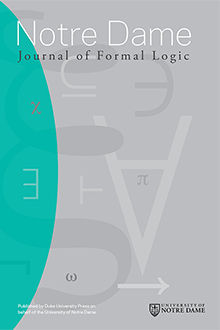Abstract
McTaggart assumed (1) that propositions cannot change in truth value and (2) if (a) there is real change, then (b) events must acquire the absolute property of being present and then lose this property. He held that {1,2b} is an inconsistent set and thus inferred $\sim$2a—that there is no real change. The B theory rejects 2 and the A theory rejects 1. I accept 1, 2, 2a, and consequently, 2b, and argue that this is consistent. There is an absolute property of presentness, but we can never predicate this property without producing an assertion in which that property is "chronologized." If at $t$, we attribute presentness, we thereby attribute presentness-at-$t$. We can grasp the existence of an absolute property which we are unable to attribute absolutely.
Citation
James Cargile. "Proposition and Tense." Notre Dame J. Formal Logic 40 (2) 250 - 257, Spring 1999. https://doi.org/10.1305/ndjfl/1038949540
Information





